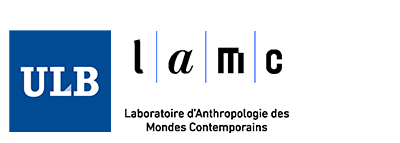Dans la même rubrique
-
Partager cette page
Séminaire ABBA - « Revolutions of Rice - Agrarian Acceleration and Ambivalent Nostalgia among Khmu in Laos » - Paul-David LUTZ et « ‘Faire son terrain’ : réflexions autour de la pratique belge de l'anthropologie en situation coloniale » - Arno LECLERCQ
Paul-David Lutz « Revolutions of Rice - Agrarian Acceleration and Ambivalent Nostalgia among Khmu in Laos » et Arno Leclercq « ‘Faire son terrain’ : réflexions autour de la pratique belge de l'anthropologie en situation coloniale »
Intervenants : Paul-David LUTZ et Arno LECLERCQ
Lieu : ULB - Campus Solbosch, Institut de Sociologie (Bâtiment S), Salle Doucy S12.123, 12e étage, Rue Jeanne, 44, 1050 - Bruxelles
Lien Zoom : https://us06web.zoom.us/j/82829817139?pwd=LvZXdsNQ3UgOVJTBWL7hB7z1BORzXt.1
Intervention 1
Title: Revolutions of Rice - Agrarian Acceleration and Ambivalent Nostalgia among Khmu in Laos
Bio: Dr. Paul-David Lutz is a (former) rural development advisor turned anthropologist with a longstanding focus on northern Laos. He holds a PhD in anthropology from the University of Sydney and an MA in Intercultural Education from the Freie Universität Berlin. His published work touches on intergenerational aspects of agrarian change, socio-cosmological aspects of resource-driven development, social(ist) media dynamics, Laos-China relations, intra-upland interethnic dynamics and ethnographic history. Dr. Lutz is currently an FNRS-CR postdoctoral fellow at LAMC (2024-2027, research project title: Animism and Agrarian Transition in Market-Socialist Laos).
Summary: Acceleration and nostalgia are key hallmarks of the perpetually ill-defined process of be(com)ing “modern”. Social scientists – and anthropologists in particular – have asserted that experiences of modernization-as-acceleration routinely spawn wistful desires for the ostensibly slower and more wholesome pace of pre-modern life. Such longings have been implicated in everyday forms of (peasant) resistance, in subversive social movements espousing a decelerated post- or countermodernity and, more recently, in efforts to address the anthropogenic ecological crises engendered by our “overheating” global economy.
Drawing on extended field research among pro-revolutionary Khmu peasants in the Lao People’s Democratic Republic (Lao PDR), this talk offers critical, grounded reflections on the alleged concomitance of modernist acceleration and anti-modernist nostalgia. It does so by relating the Lao state’s longstanding pursuit of agricultural acceleration to local (reflections on) changes in rice cultivation. What might changes in rice seed selection and cultivation cycles reveal about Khmu peasants' engagements with/evaluations of the Lao revolution's Marxist-cum-market-Leninist modernization project? How – if at all – might the subversive potential of “nostalgia for slowness” play out in settings where indigenous peasants have historically considered themselves not victims but (ambivalent) beneficiaries, stakeholders and vanguards of “catch up” development and high modernist agri-cultural change?
Intervention 2
Titre : « Faire son terrain » : réflexions autour de la pratique belge de l’anthropologie en situation coloniale
Bio : Doctorant.e en anthropologie le jour, et artiste de cabaret queer la nuit, je m’intéresse à la constitution de communautés de pratique tel que l’anthropologie, sous une optique sociologique et historique. A l’aide de fonds d’archive publics et privés, de ressources publiées et de témoignages oraux, le cœur de mon travail consiste en l’étude du processus autonomisation de l’anthropologie belge en tant que sphère d’activité sociale. Plus largement, je m’intéresse à la carrière des anthropologues, leur construction identitaire et la professionnalisation de leur pratique.
Résumé : Canoniquement, la réalisation d’un « terrain ethnographique » est souvent conçue comme le rite d’institution par lequel l’anthropologue légitime, aux yeux de ses pairs-concurrents, sa stature professionnelle. Le fait de « faire son terrain » officie comme un tournant pour la carrière de l’anthropologue du fait qu’il l’inscrive dans un communauté de pratique et au sein d’un métier qui partage des codes sociaux, des savoir-faire, des savoir-être, et des représentations ; qui sont autant de marqueurs d’une position sociale bien spécifique. Dans cette communication, j’entends ainsi décrire le processus de construction identitaire des premiers anthropologues professionnels belges, en situation coloniale, sous mandat de l’Institut pour la Recherche Scientifique en Afrique Centrale (IRSAC), durant les années 1950.
PhD Student, Aspirant F.R.S. - FNRS
Université libre de Bruxelles, Avenue Jeanne 44, 1050 Bruxelles
LAMC, bureau S.12.214
- Séminaire Anthropologie Bruxelles/ Brussels Anthropology (ABBA)
- Atelier doctoral "Unveil the Kitchen"
Université de Strasbourg, 5 allée du général Rouvillois, 67000 Strasbourg
de 14h à 16h
ULB - Campus du Solbosch
Institut de Sociologie (bâtiment S)
Salle Doucy - 12e étage - S12.123
44 avenue Jeanne - 1050 Bruxelles
Lien Zoom : https://us06web.zoom.us/j/82829817139?pwd=LvZXdsNQ3UgOVJTBWL7hB7z1BORzXt.1
